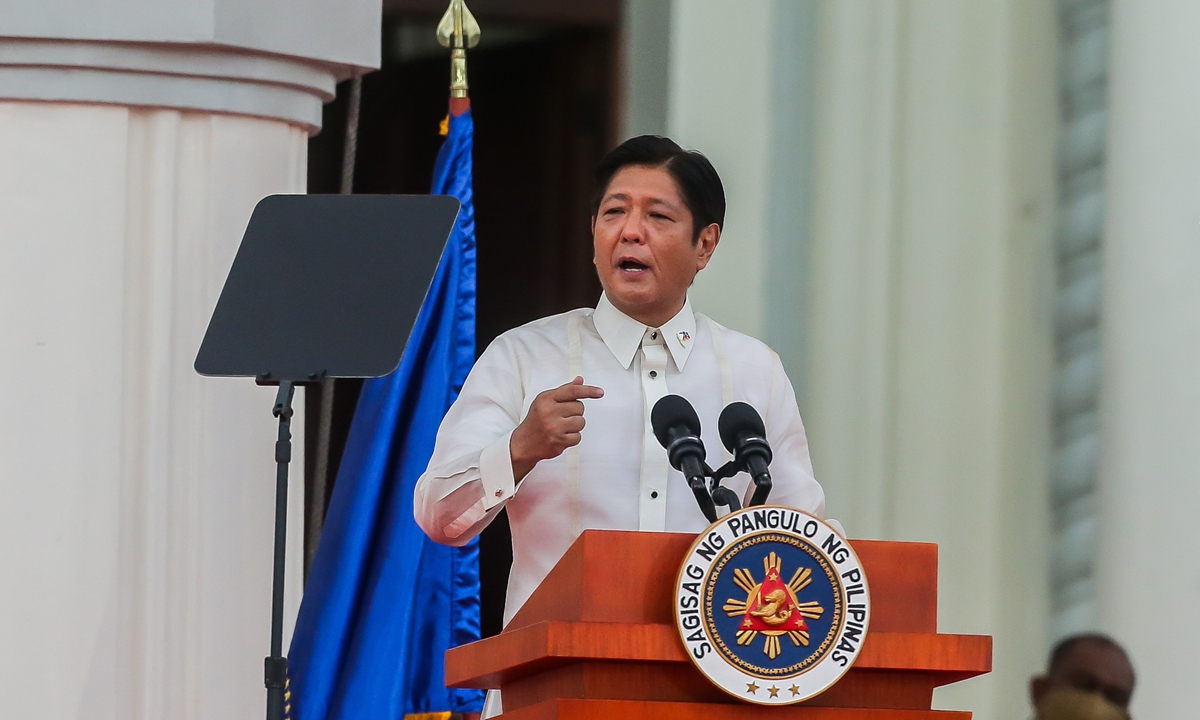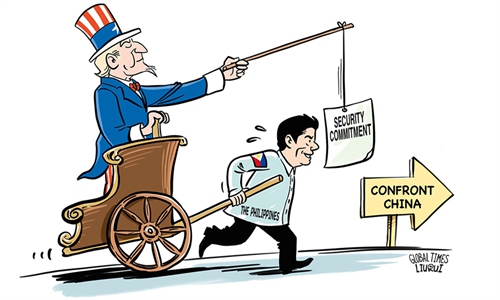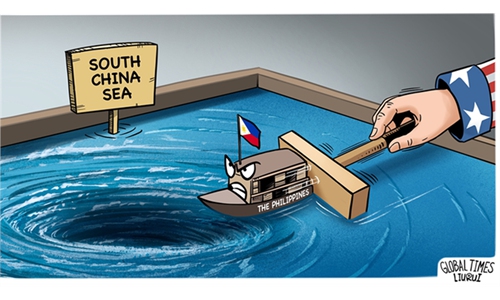
Ferdinand Romualdez Marcos, Jr. delivers his inaugural address as the 17th president of the Philippines at the National Museum in Manila in front of thousands of people on July 1, 2022. Photo:Xinhua
Recently, the Philippines has once again denied that China and the Philippines had reached a "gentleman's agreement" on the South China Sea issue. Philippine Defense Secretary Gilberto Teodoro stated on Saturday that since Philippine President Ferdinand Marcos Jr took office in 2022, the Philippine Defense Department is "not aware of, nor is it a party to, any internal agreement with China."
However, Manila's stance not only ignores the joint efforts made by China and the Philippines in maintaining regional stability and peace but also will have a negative impact on the future of China-Philippines relations and the security situation in the South China Sea.
As is well known, a "gentleman's agreement" is an informal, non-binding agreement that relies on the credibility and integrity of the parties involved to be implemented rather than enforced through legal means. Compared to formal treaties, the "gentleman's agreement" is more flexible to maintain specific social order or policy goals. In other words, it can be seen as a kind of consensus and "understanding." In a complex international environment, this allows countries to quickly coordinate positions and actions and deal with emergencies.
Previously, when the situation in the South China Sea was extremely severe, regional peace and stability were severely threatened. The Chinese government and the Duterte government reached a "gentleman's agreement" with the aim of maintaining regional peace and preventing the escalation of the South China Sea disputes into regional conflicts. This not only serves the national interests of both sides but also the long-term interests and moral standards of the international community. China and the Philippines reached consensus on restricting military activities in sensitive areas and mutual understanding in humanitarian and material exchanges. In fact, it was precisely because both sides had been adhering to this agreement until early February last year that they effectively helped both sides control the situation and avoid potential military conflicts.
Currently, the Marcos government of the Philippines has publicly reneged on and denied the "gentleman's agreement" between the two countries, which has a significant element of political showmanship. But this is very unwise, and the real damage is to the Philippines itself.
Reneging on the "gentleman's agreement" has an obvious impact on the international reputation of the Philippines. The "gentleman's agreement" is based on the credibility and mutual respect of all parties. The current government's denial of its existence will lead to doubts about its credibility in the international community, affecting its reputation on the international stage and directly impacting its weight and effectiveness in negotiations on international affairs in the future. At the same time, it will also affect the economic cooperation and political mutual trust between the Philippines and other countries, thus causing long-term adverse effects on the national development of the Philippines.
Such inconsistency in diplomacy is likely to be criticized even within the Philippines. At the same time, violating the "gentleman's agreement" will escalate tensions in the South China Sea, increase militarization tendencies, or cause frequent confrontations, thereby increasing the probability of instability and conflict in the South China Sea region. This is obviously detrimental to the Philippines, which relies on a stable regional environment to maintain economic and social development. Opportunistic external powers may intervene, posing higher national security risks to the Philippines.
From a regional perspective, the behavior of the Philippines has undermined the regional cohesion of ASEAN, and the Philippines is likely to be seen as a "dangerous neighbor." ASEAN, as a regional organization, aims to enhance regional stability, security, and economic development through cooperation. The Philippines' unilateral breach of trust on the South China Sea issue has had a negative impact on the cohesion and diplomatic strategy of the entire organization. Currently, the behavior of the Philippines is irresponsible for ASEAN, weakening the organization's unified position and influence on the international stage, thereby affecting the strategic interests of the entire region.
In a tense geopolitical environment, trust and communication are the two most valuable assets. The Marcos government's reneging on and denial of the "gentleman's agreement" have damaged the foundation of trust between China and the Philippines and also exposed Manila's disregard of dialogue and cooperation in the South China Sea disputes, instead showing a tendency to act recklessly and turn toward confrontation and conflict. This will have serious negative impact on various aspects of the Philippine government, including its reputation, politics, strategy, economy, and security. The Philippine government needs to carefully consider its foreign policy to avoid irreversible losses on the international stage.



